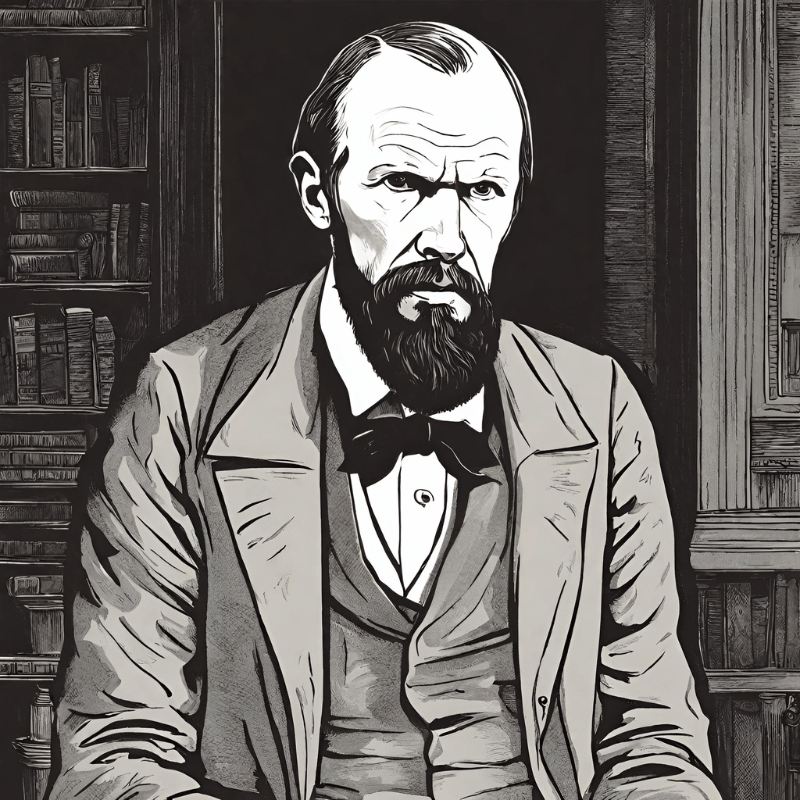
We’ve all had those days where we just wake up on the wrong side of the bed, you know? Everything seems irritating and nothing feels right. The coffee is too bitter, traffic is a nightmare, and people are grating on your last nerve. By the afternoon, you’re in a full-fledged funk and not even your favourite show can lift your mood. As the day wears on, that mess of emotions just ferments into a big old bottle of bitterness.
I imagine that’s how the unnamed man at the center of Fyodor Dostoevsky’s 1864 novella Notes From Underground must have felt on a daily basis. This guy who has come to be known as “the underground man” takes his perpetual bad mood to the next level. While the rest of us eventually climb out of our funk holes, he seems content to wallow down there in his misery forever. What’s his deal? Why is he always in such a mood? And, more importantly, why should we still read his ramblings over 150 years later?
Read Notes From Underground By Dostoevsky For Free

Are you looking to read Dostoevsky’s classic novel “Notes From Underground” without spending any money? You’re in luck.
Our website offers free downloads of Notes From Underground in both ePub and PDF formats. Whether you prefer reading on your e-reader or printed book, we’ve got you covered.
Once downloaded, you can immerse yourself in Dostoevsky’s compelling narrative at your leisure, whether at home or on the go. The story delves deeply into the complex inner mind of the protagonist.
Rather than purchasing it, you can now experience this timeless psychological work for free. Download Notes From Underground today and see for yourself why it remains so highly regarded.
Understanding the Underground Man’s Psychological Torment
On the surface, the underground man comes across as a cantankerous curmudgeon – the type of guy who complains just for the sake of hearing himself complain. But beneath the unpleasant exterior, Dostoevsky gives us glimpses of a deeper psychological torment. This is a man profoundly insecure about his own insignificance in a modern world that prizes success, rationality, and social standing above all else. As an former civil servant living on a meager pension in 19th century St. Petersburg, the underground man is acutely aware of how far he has fallen from societal ideals of manhood, achievement and prestige.
The dissonance between his grandiose self-image and the depressing reality of his mundane existence creates an unbearable cognitive dissonance. Unable to resolve this disconnect between who he believes himself to be and who the world sees, he lashes out in petty acts of rebellion. Nothing is ever good enough for him and he takes pleasure in mocking any ideals or social norms he perceives as inauthentic or constraining. In many ways, the underground man is the original “hater” – constantly finding fault because deep down, he hates himself most of all.
Sound familiar? While technology and social mores have undoubtedly evolved since Dostoevsky’s time, human nature remains fundamentally the same. We all struggle with feelings of inadequacy, self-loathing, and the desire to assert our individuality against societal demands. Social media has amplified these inner conflicts to new extremes, as projecting a highlight reel of our lives often breeds invidious comparisons. The underground man’s strategy of lashing out in petty vengeance through put-downs still plays out daily in Internet comment sections and heated political debates.
Relevance of Notes From Underground in Today’s Digital Age
Perhaps this is why Notes From Underground maintains its relevance – the man underground represents our basest, most irrational impulses laid bare. Dostoevsky understood that no amount of progress or comfort could ever fully civilize or rationalize human beings. Beneath the veneer of our curated digital identities lies a roiling sea of insecurity, resentment, and unmet cravings that often steer us toward self-sabotage instead of self-actualization. The underground man gets us because he is us, in our most unimproved state.
It’s easy to get pulled down into that underground mental funk if left to dwell there too long. The saving grace is that most people, thankfully, don’t make a permanent lifestyle of it like the protagonist does. We hit the snooze button and force ourselves back into the light of day eventually. But the underground man is a powerful reminder that it only takes a slight shift in circumstances – a broken heart, a job loss – to send any one of us spiraling back into that dark psychological space. His notes ring so true because they come straight from the seething id, unfiltered by politeness, optimism or aspirations of posterity.
So in an era where curating happiness is a full-time job and outrage sells better than nuance, the underground man remains an bracing antidote to toxic positivity. Notes From Underground is a sobering reminder that beyond likes, followers and carefully staged presentations, we are still prisoners of base motives and turbulent emotions Dostoevsky knew so well. His unnamed hero may live underground, but he understands the human condition anywhere – and that’s why his uncomfortable musings will continue troubling readers for generations to come.
